(PDF) Work-Life Balance During COVID-19 Pandemic
VerifiedAdded on 2021/11/16
|14
|4194
|36
AI Summary
Contribute Materials
Your contribution can guide someone’s learning journey. Share your
documents today.
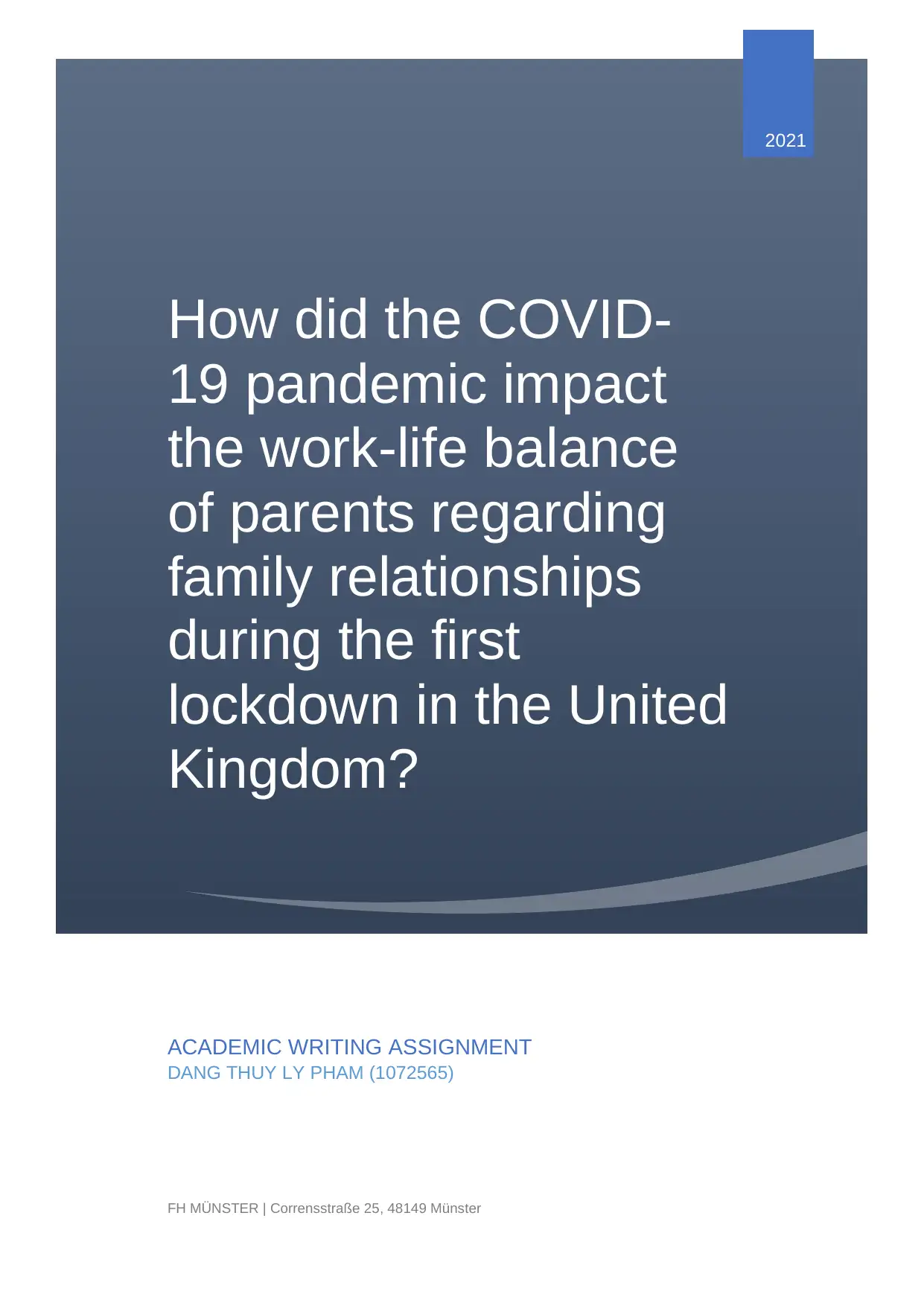
How did the COVID-
19 pandemic impact
the work-life balance
of parents regarding
family relationships
during the first
lockdown in the United
Kingdom?
2021
ACADEMIC WRITING ASSIGNMENT
DANG THUY LY PHAM (1072565)
FH MÜNSTER | Corrensstraße 25, 48149 Münster
19 pandemic impact
the work-life balance
of parents regarding
family relationships
during the first
lockdown in the United
Kingdom?
2021
ACADEMIC WRITING ASSIGNMENT
DANG THUY LY PHAM (1072565)
FH MÜNSTER | Corrensstraße 25, 48149 Münster
Secure Best Marks with AI Grader
Need help grading? Try our AI Grader for instant feedback on your assignments.
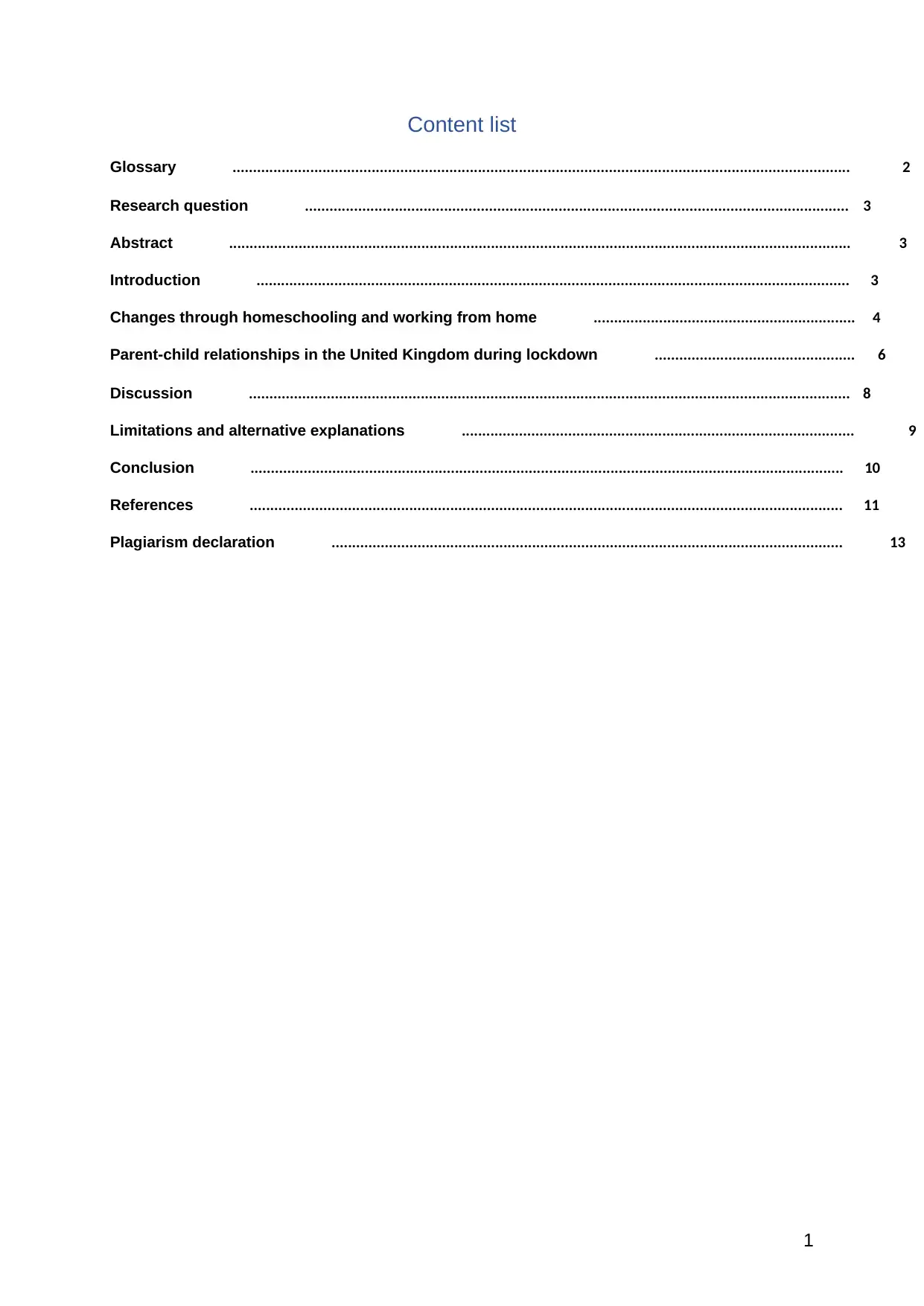
1
Content list
Glossary ....................................................................................................................................................... 2
Research question ..................................................................................................................................... 3
Abstract ........................................................................................................................................................ 3
Introduction ................................................................................................................................................. 3
Changes through homeschooling and working from home ................................................................ 4
Parent-child relationships in the United Kingdom during lockdown ................................................. 6
Discussion ................................................................................................................................................... 8
Limitations and alternative explanations ................................................................................................ 9
Conclusion ................................................................................................................................................. 10
References ................................................................................................................................................. 11
Plagiarism declaration ............................................................................................................................. 13
Content list
Glossary ....................................................................................................................................................... 2
Research question ..................................................................................................................................... 3
Abstract ........................................................................................................................................................ 3
Introduction ................................................................................................................................................. 3
Changes through homeschooling and working from home ................................................................ 4
Parent-child relationships in the United Kingdom during lockdown ................................................. 6
Discussion ................................................................................................................................................... 8
Limitations and alternative explanations ................................................................................................ 9
Conclusion ................................................................................................................................................. 10
References ................................................................................................................................................. 11
Plagiarism declaration ............................................................................................................................. 13
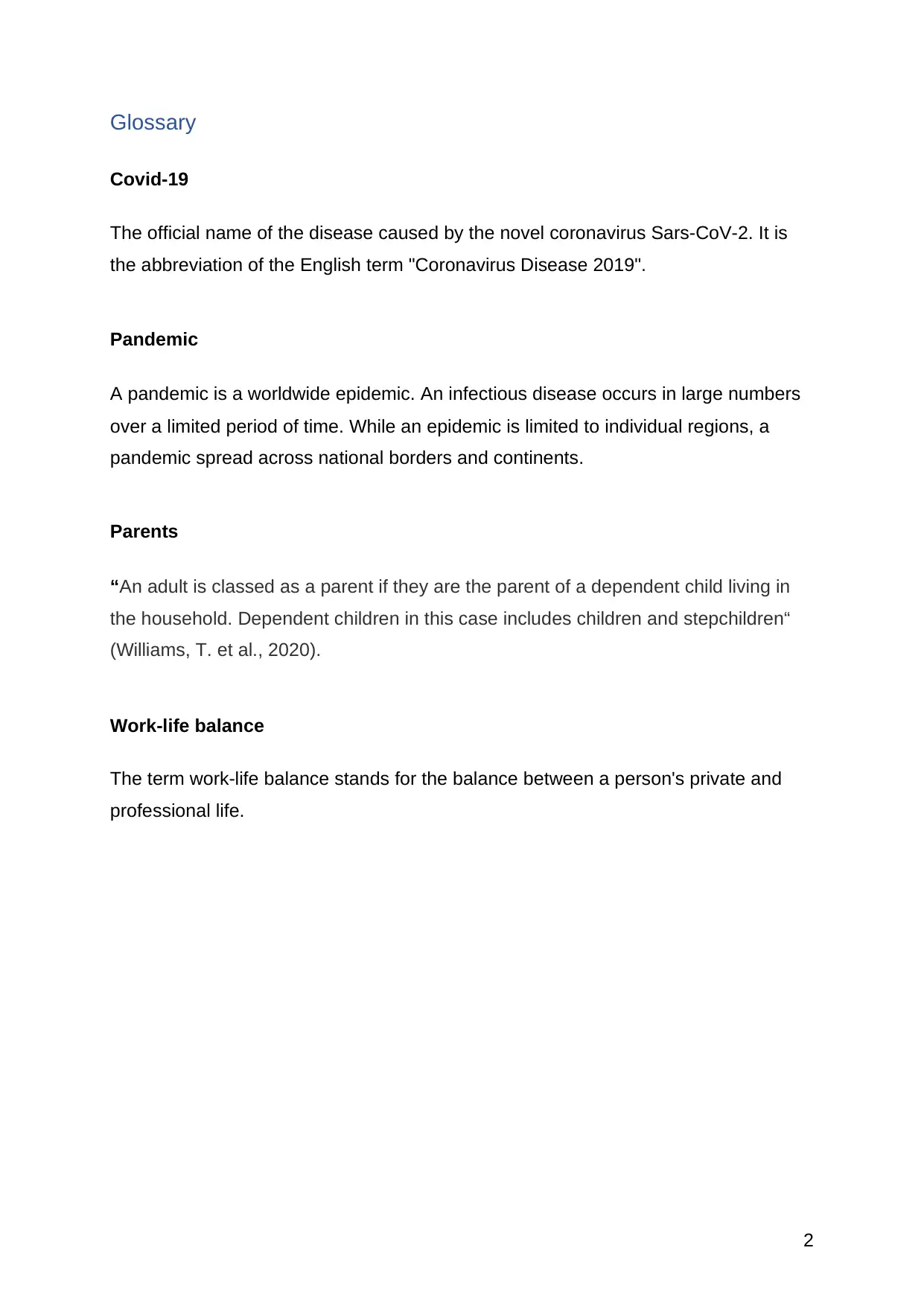
2
Glossary
Covid-19
The official name of the disease caused by the novel coronavirus Sars-CoV-2. It is
the abbreviation of the English term "Coronavirus Disease 2019".
Pandemic
A pandemic is a worldwide epidemic. An infectious disease occurs in large numbers
over a limited period of time. While an epidemic is limited to individual regions, a
pandemic spread across national borders and continents.
Parents
“An adult is classed as a parent if they are the parent of a dependent child living in
the household. Dependent children in this case includes children and stepchildren“
(Williams, T. et al., 2020).
Work-life balance
The term work-life balance stands for the balance between a person's private and
professional life.
Glossary
Covid-19
The official name of the disease caused by the novel coronavirus Sars-CoV-2. It is
the abbreviation of the English term "Coronavirus Disease 2019".
Pandemic
A pandemic is a worldwide epidemic. An infectious disease occurs in large numbers
over a limited period of time. While an epidemic is limited to individual regions, a
pandemic spread across national borders and continents.
Parents
“An adult is classed as a parent if they are the parent of a dependent child living in
the household. Dependent children in this case includes children and stepchildren“
(Williams, T. et al., 2020).
Work-life balance
The term work-life balance stands for the balance between a person's private and
professional life.
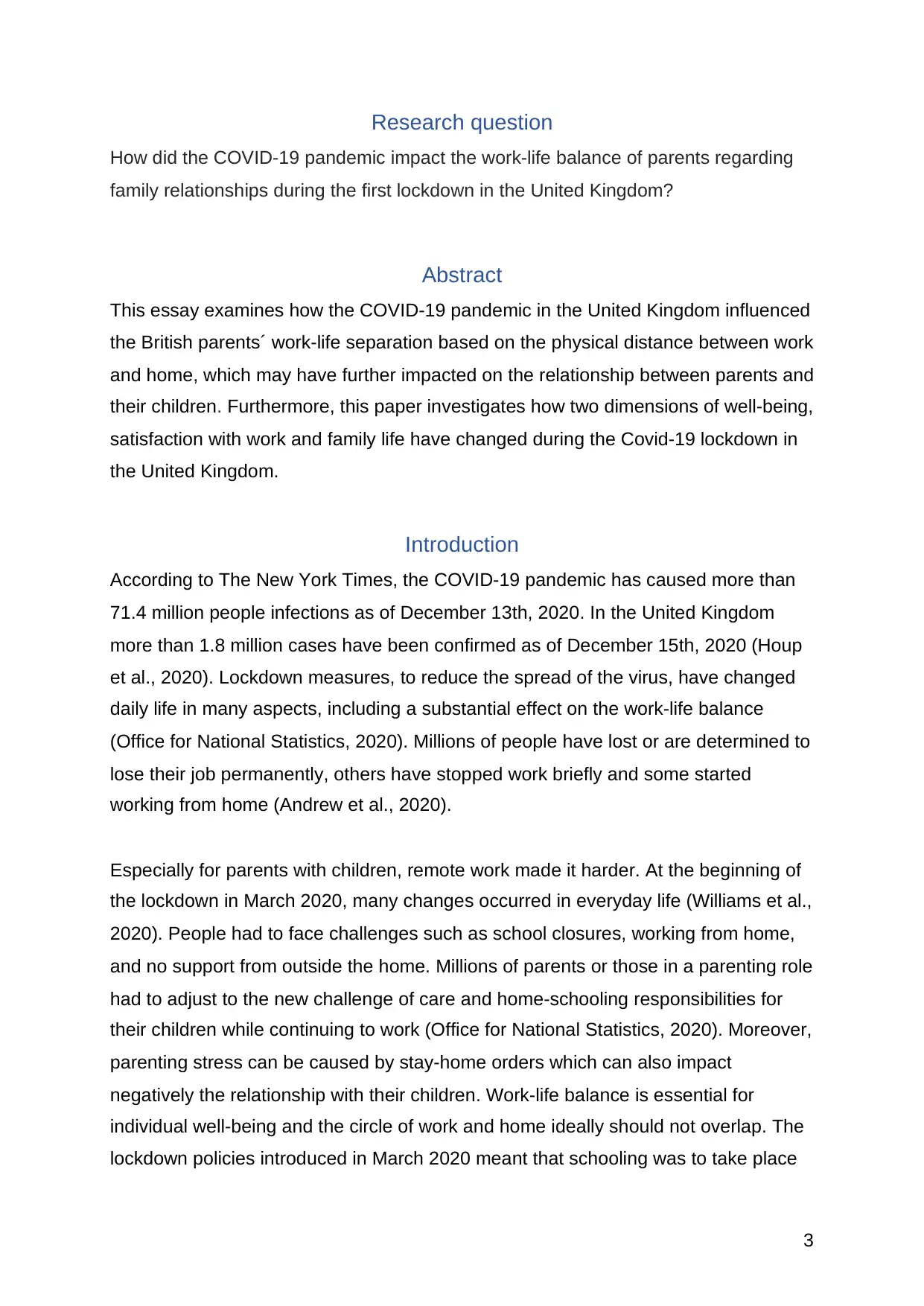
3
Research question
How did the COVID-19 pandemic impact the work-life balance of parents regarding
family relationships during the first lockdown in the United Kingdom?
Abstract
This essay examines how the COVID-19 pandemic in the United Kingdom influenced
the British parents´ work-life separation based on the physical distance between work
and home, which may have further impacted on the relationship between parents and
their children. Furthermore, this paper investigates how two dimensions of well-being,
satisfaction with work and family life have changed during the Covid-19 lockdown in
the United Kingdom.
Introduction
According to The New York Times, the COVID-19 pandemic has caused more than
71.4 million people infections as of December 13th, 2020. In the United Kingdom
more than 1.8 million cases have been confirmed as of December 15th, 2020 (Houp
et al., 2020). Lockdown measures, to reduce the spread of the virus, have changed
daily life in many aspects, including a substantial effect on the work-life balance
(Office for National Statistics, 2020). Millions of people have lost or are determined to
lose their job permanently, others have stopped work briefly and some started
working from home (Andrew et al., 2020).
Especially for parents with children, remote work made it harder. At the beginning of
the lockdown in March 2020, many changes occurred in everyday life (Williams et al.,
2020). People had to face challenges such as school closures, working from home,
and no support from outside the home. Millions of parents or those in a parenting role
had to adjust to the new challenge of care and home-schooling responsibilities for
their children while continuing to work (Office for National Statistics, 2020). Moreover,
parenting stress can be caused by stay-home orders which can also impact
negatively the relationship with their children. Work-life balance is essential for
individual well-being and the circle of work and home ideally should not overlap. The
lockdown policies introduced in March 2020 meant that schooling was to take place
Research question
How did the COVID-19 pandemic impact the work-life balance of parents regarding
family relationships during the first lockdown in the United Kingdom?
Abstract
This essay examines how the COVID-19 pandemic in the United Kingdom influenced
the British parents´ work-life separation based on the physical distance between work
and home, which may have further impacted on the relationship between parents and
their children. Furthermore, this paper investigates how two dimensions of well-being,
satisfaction with work and family life have changed during the Covid-19 lockdown in
the United Kingdom.
Introduction
According to The New York Times, the COVID-19 pandemic has caused more than
71.4 million people infections as of December 13th, 2020. In the United Kingdom
more than 1.8 million cases have been confirmed as of December 15th, 2020 (Houp
et al., 2020). Lockdown measures, to reduce the spread of the virus, have changed
daily life in many aspects, including a substantial effect on the work-life balance
(Office for National Statistics, 2020). Millions of people have lost or are determined to
lose their job permanently, others have stopped work briefly and some started
working from home (Andrew et al., 2020).
Especially for parents with children, remote work made it harder. At the beginning of
the lockdown in March 2020, many changes occurred in everyday life (Williams et al.,
2020). People had to face challenges such as school closures, working from home,
and no support from outside the home. Millions of parents or those in a parenting role
had to adjust to the new challenge of care and home-schooling responsibilities for
their children while continuing to work (Office for National Statistics, 2020). Moreover,
parenting stress can be caused by stay-home orders which can also impact
negatively the relationship with their children. Work-life balance is essential for
individual well-being and the circle of work and home ideally should not overlap. The
lockdown policies introduced in March 2020 meant that schooling was to take place
Secure Best Marks with AI Grader
Need help grading? Try our AI Grader for instant feedback on your assignments.
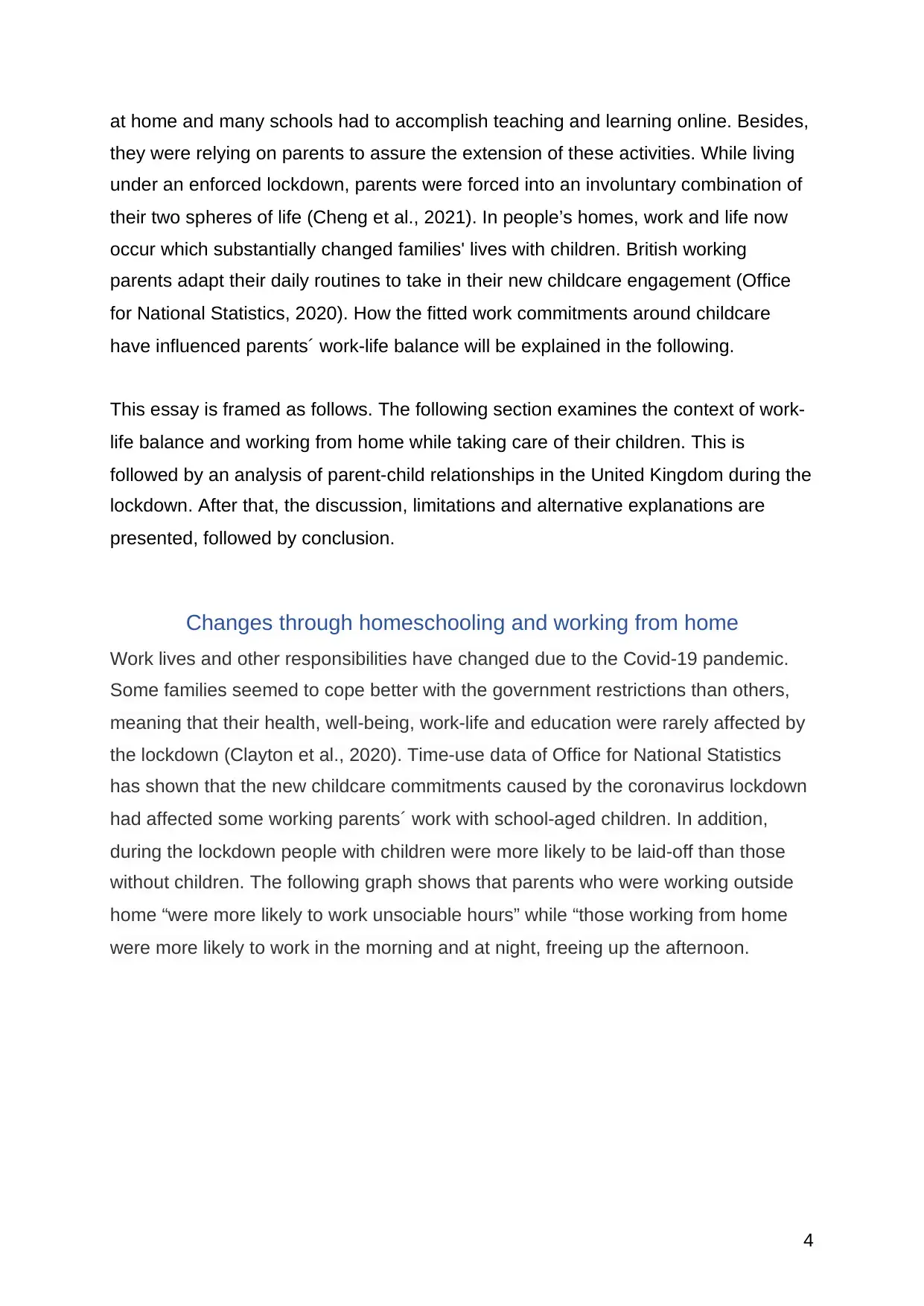
4
at home and many schools had to accomplish teaching and learning online. Besides,
they were relying on parents to assure the extension of these activities. While living
under an enforced lockdown, parents were forced into an involuntary combination of
their two spheres of life (Cheng et al., 2021). In people’s homes, work and life now
occur which substantially changed families' lives with children. British working
parents adapt their daily routines to take in their new childcare engagement (Office
for National Statistics, 2020). How the fitted work commitments around childcare
have influenced parents´ work-life balance will be explained in the following.
This essay is framed as follows. The following section examines the context of work-
life balance and working from home while taking care of their children. This is
followed by an analysis of parent-child relationships in the United Kingdom during the
lockdown. After that, the discussion, limitations and alternative explanations are
presented, followed by conclusion.
Changes through homeschooling and working from home
Work lives and other responsibilities have changed due to the Covid-19 pandemic.
Some families seemed to cope better with the government restrictions than others,
meaning that their health, well-being, work-life and education were rarely affected by
the lockdown (Clayton et al., 2020). Time-use data of Office for National Statistics
has shown that the new childcare commitments caused by the coronavirus lockdown
had affected some working parents´ work with school-aged children. In addition,
during the lockdown people with children were more likely to be laid-off than those
without children. The following graph shows that parents who were working outside
home “were more likely to work unsociable hours” while “those working from home
were more likely to work in the morning and at night, freeing up the afternoon.
at home and many schools had to accomplish teaching and learning online. Besides,
they were relying on parents to assure the extension of these activities. While living
under an enforced lockdown, parents were forced into an involuntary combination of
their two spheres of life (Cheng et al., 2021). In people’s homes, work and life now
occur which substantially changed families' lives with children. British working
parents adapt their daily routines to take in their new childcare engagement (Office
for National Statistics, 2020). How the fitted work commitments around childcare
have influenced parents´ work-life balance will be explained in the following.
This essay is framed as follows. The following section examines the context of work-
life balance and working from home while taking care of their children. This is
followed by an analysis of parent-child relationships in the United Kingdom during the
lockdown. After that, the discussion, limitations and alternative explanations are
presented, followed by conclusion.
Changes through homeschooling and working from home
Work lives and other responsibilities have changed due to the Covid-19 pandemic.
Some families seemed to cope better with the government restrictions than others,
meaning that their health, well-being, work-life and education were rarely affected by
the lockdown (Clayton et al., 2020). Time-use data of Office for National Statistics
has shown that the new childcare commitments caused by the coronavirus lockdown
had affected some working parents´ work with school-aged children. In addition,
during the lockdown people with children were more likely to be laid-off than those
without children. The following graph shows that parents who were working outside
home “were more likely to work unsociable hours” while “those working from home
were more likely to work in the morning and at night, freeing up the afternoon.
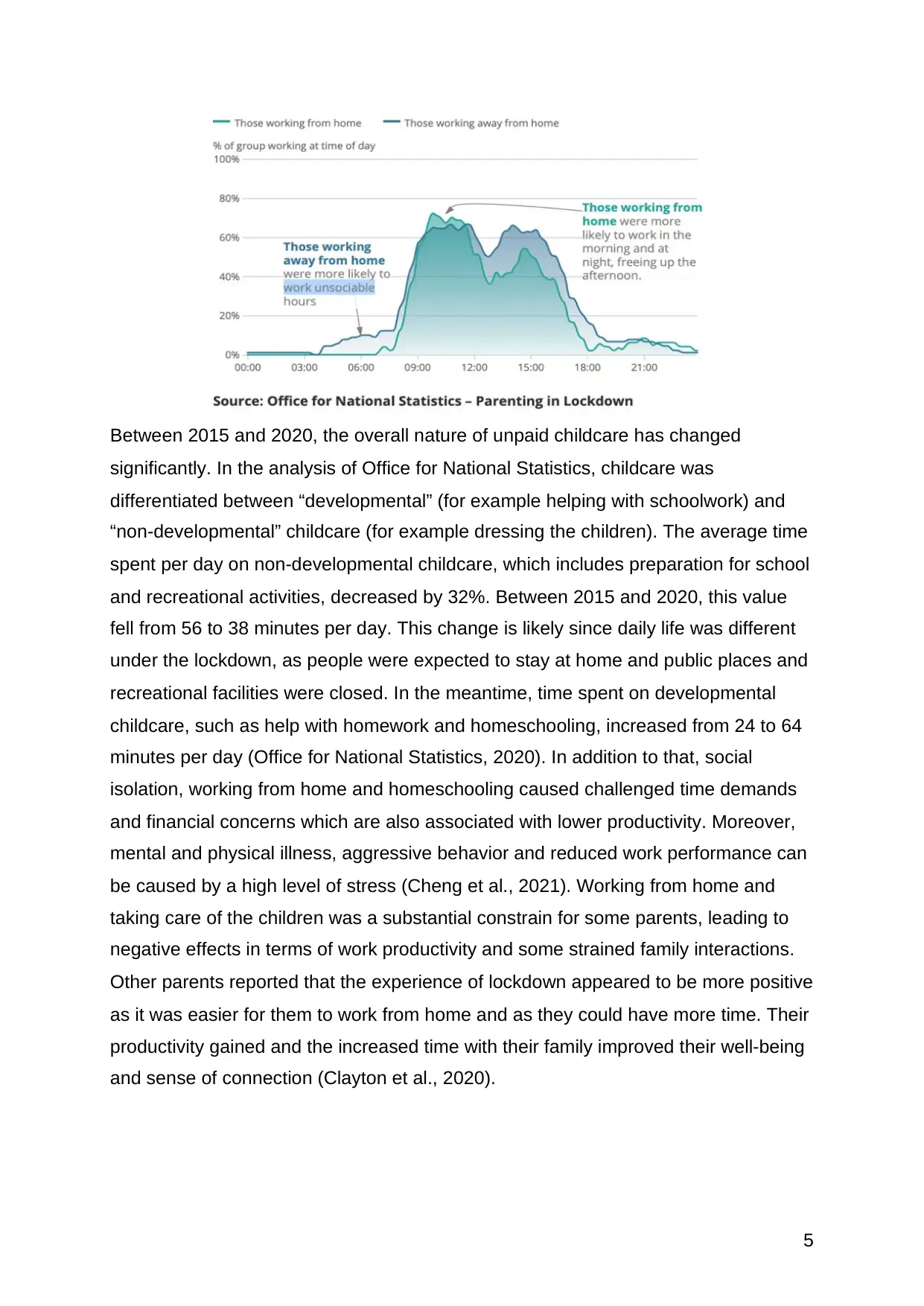
5
Between 2015 and 2020, the overall nature of unpaid childcare has changed
significantly. In the analysis of Office for National Statistics, childcare was
differentiated between “developmental” (for example helping with schoolwork) and
“non-developmental” childcare (for example dressing the children). The average time
spent per day on non-developmental childcare, which includes preparation for school
and recreational activities, decreased by 32%. Between 2015 and 2020, this value
fell from 56 to 38 minutes per day. This change is likely since daily life was different
under the lockdown, as people were expected to stay at home and public places and
recreational facilities were closed. In the meantime, time spent on developmental
childcare, such as help with homework and homeschooling, increased from 24 to 64
minutes per day (Office for National Statistics, 2020). In addition to that, social
isolation, working from home and homeschooling caused challenged time demands
and financial concerns which are also associated with lower productivity. Moreover,
mental and physical illness, aggressive behavior and reduced work performance can
be caused by a high level of stress (Cheng et al., 2021). Working from home and
taking care of the children was a substantial constrain for some parents, leading to
negative effects in terms of work productivity and some strained family interactions.
Other parents reported that the experience of lockdown appeared to be more positive
as it was easier for them to work from home and as they could have more time. Their
productivity gained and the increased time with their family improved their well-being
and sense of connection (Clayton et al., 2020).
Between 2015 and 2020, the overall nature of unpaid childcare has changed
significantly. In the analysis of Office for National Statistics, childcare was
differentiated between “developmental” (for example helping with schoolwork) and
“non-developmental” childcare (for example dressing the children). The average time
spent per day on non-developmental childcare, which includes preparation for school
and recreational activities, decreased by 32%. Between 2015 and 2020, this value
fell from 56 to 38 minutes per day. This change is likely since daily life was different
under the lockdown, as people were expected to stay at home and public places and
recreational facilities were closed. In the meantime, time spent on developmental
childcare, such as help with homework and homeschooling, increased from 24 to 64
minutes per day (Office for National Statistics, 2020). In addition to that, social
isolation, working from home and homeschooling caused challenged time demands
and financial concerns which are also associated with lower productivity. Moreover,
mental and physical illness, aggressive behavior and reduced work performance can
be caused by a high level of stress (Cheng et al., 2021). Working from home and
taking care of the children was a substantial constrain for some parents, leading to
negative effects in terms of work productivity and some strained family interactions.
Other parents reported that the experience of lockdown appeared to be more positive
as it was easier for them to work from home and as they could have more time. Their
productivity gained and the increased time with their family improved their well-being
and sense of connection (Clayton et al., 2020).
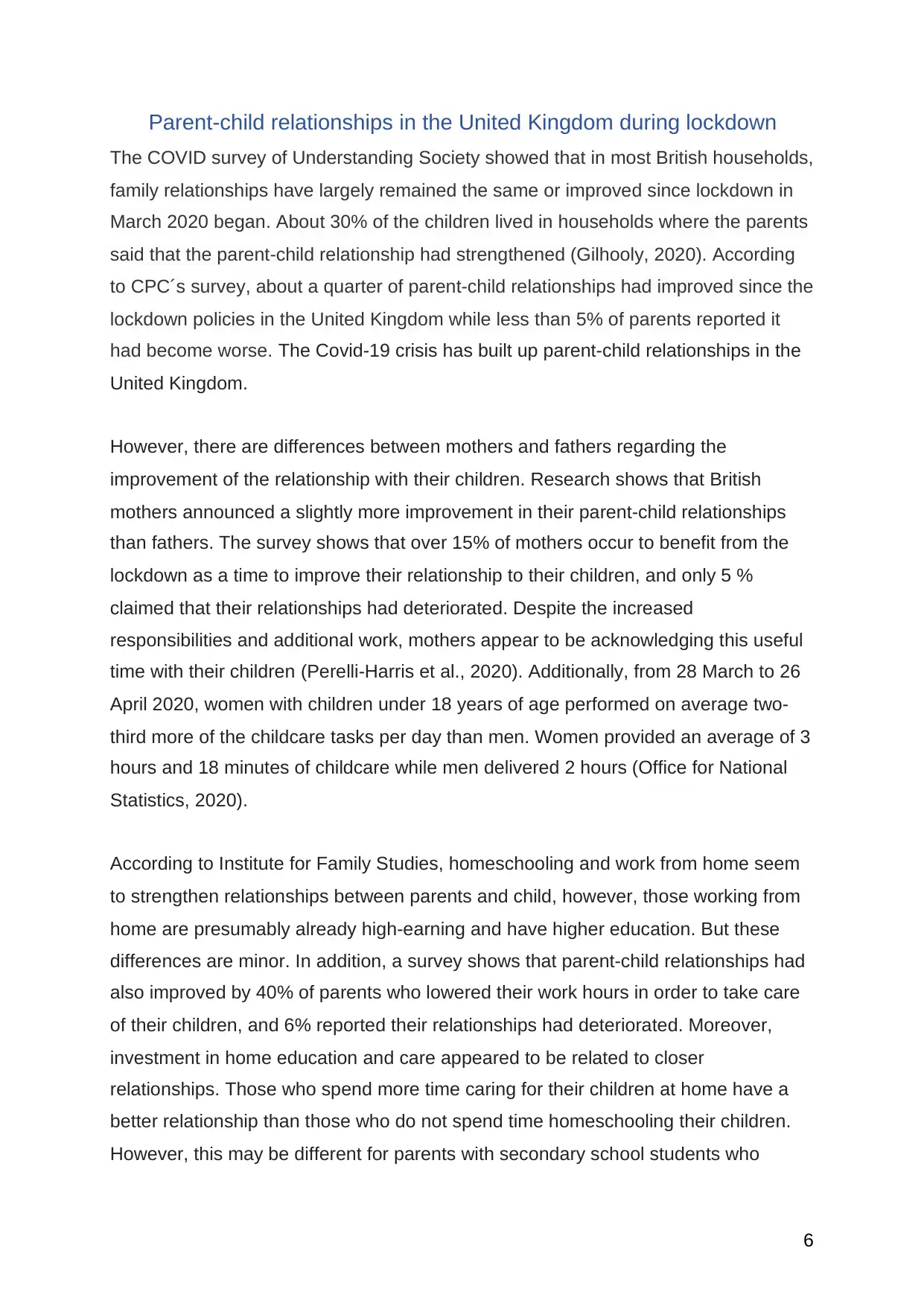
6
Parent-child relationships in the United Kingdom during lockdown
The COVID survey of Understanding Society showed that in most British households,
family relationships have largely remained the same or improved since lockdown in
March 2020 began. About 30% of the children lived in households where the parents
said that the parent-child relationship had strengthened (Gilhooly, 2020). According
to CPC´s survey, about a quarter of parent-child relationships had improved since the
lockdown policies in the United Kingdom while less than 5% of parents reported it
had become worse. The Covid-19 crisis has built up parent-child relationships in the
United Kingdom.
However, there are differences between mothers and fathers regarding the
improvement of the relationship with their children. Research shows that British
mothers announced a slightly more improvement in their parent-child relationships
than fathers. The survey shows that over 15% of mothers occur to benefit from the
lockdown as a time to improve their relationship to their children, and only 5 %
claimed that their relationships had deteriorated. Despite the increased
responsibilities and additional work, mothers appear to be acknowledging this useful
time with their children (Perelli-Harris et al., 2020). Additionally, from 28 March to 26
April 2020, women with children under 18 years of age performed on average two-
third more of the childcare tasks per day than men. Women provided an average of 3
hours and 18 minutes of childcare while men delivered 2 hours (Office for National
Statistics, 2020).
According to Institute for Family Studies, homeschooling and work from home seem
to strengthen relationships between parents and child, however, those working from
home are presumably already high-earning and have higher education. But these
differences are minor. In addition, a survey shows that parent-child relationships had
also improved by 40% of parents who lowered their work hours in order to take care
of their children, and 6% reported their relationships had deteriorated. Moreover,
investment in home education and care appeared to be related to closer
relationships. Those who spend more time caring for their children at home have a
better relationship than those who do not spend time homeschooling their children.
However, this may be different for parents with secondary school students who
Parent-child relationships in the United Kingdom during lockdown
The COVID survey of Understanding Society showed that in most British households,
family relationships have largely remained the same or improved since lockdown in
March 2020 began. About 30% of the children lived in households where the parents
said that the parent-child relationship had strengthened (Gilhooly, 2020). According
to CPC´s survey, about a quarter of parent-child relationships had improved since the
lockdown policies in the United Kingdom while less than 5% of parents reported it
had become worse. The Covid-19 crisis has built up parent-child relationships in the
United Kingdom.
However, there are differences between mothers and fathers regarding the
improvement of the relationship with their children. Research shows that British
mothers announced a slightly more improvement in their parent-child relationships
than fathers. The survey shows that over 15% of mothers occur to benefit from the
lockdown as a time to improve their relationship to their children, and only 5 %
claimed that their relationships had deteriorated. Despite the increased
responsibilities and additional work, mothers appear to be acknowledging this useful
time with their children (Perelli-Harris et al., 2020). Additionally, from 28 March to 26
April 2020, women with children under 18 years of age performed on average two-
third more of the childcare tasks per day than men. Women provided an average of 3
hours and 18 minutes of childcare while men delivered 2 hours (Office for National
Statistics, 2020).
According to Institute for Family Studies, homeschooling and work from home seem
to strengthen relationships between parents and child, however, those working from
home are presumably already high-earning and have higher education. But these
differences are minor. In addition, a survey shows that parent-child relationships had
also improved by 40% of parents who lowered their work hours in order to take care
of their children, and 6% reported their relationships had deteriorated. Moreover,
investment in home education and care appeared to be related to closer
relationships. Those who spend more time caring for their children at home have a
better relationship than those who do not spend time homeschooling their children.
However, this may be different for parents with secondary school students who
Paraphrase This Document
Need a fresh take? Get an instant paraphrase of this document with our AI Paraphraser
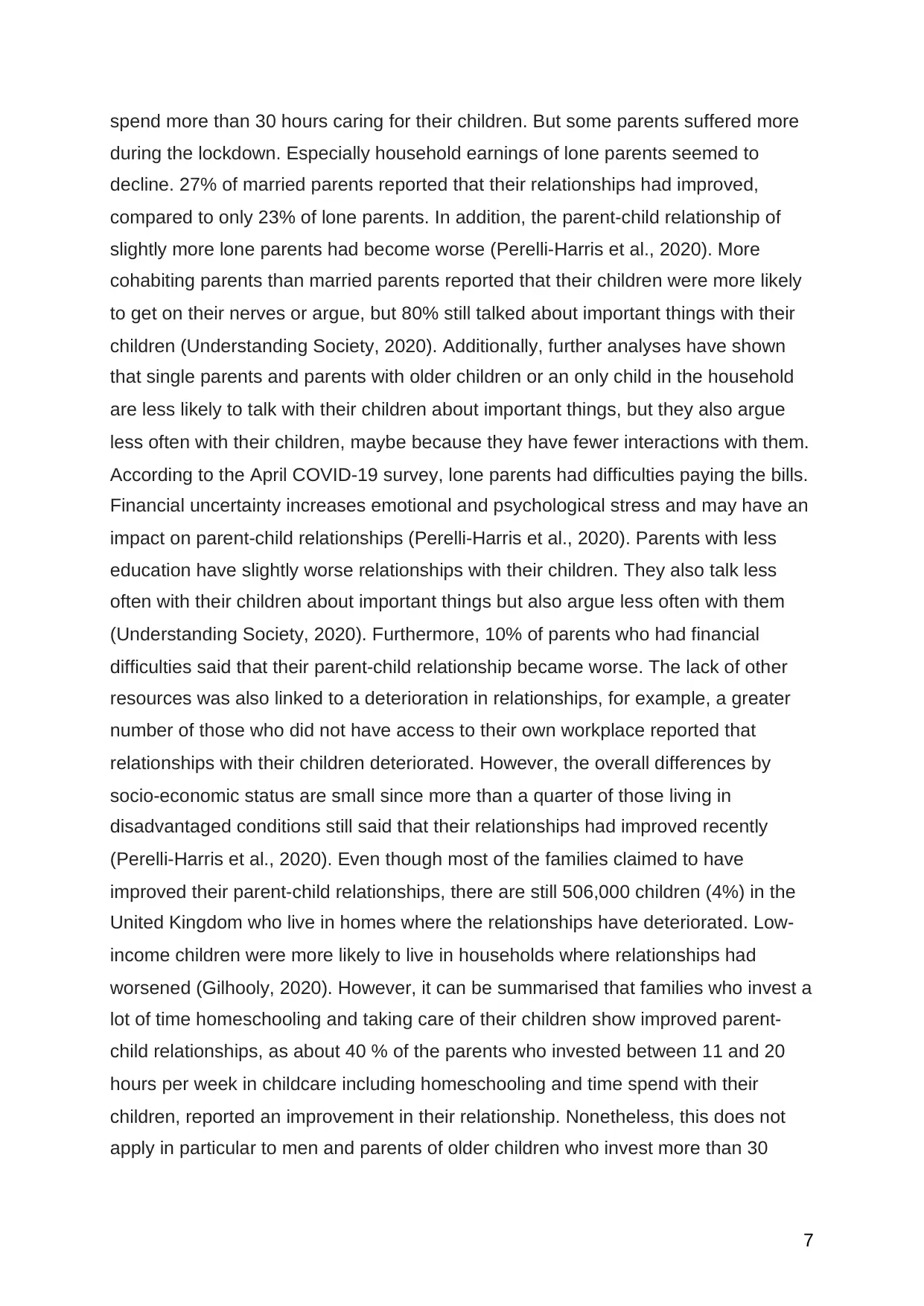
7
spend more than 30 hours caring for their children. But some parents suffered more
during the lockdown. Especially household earnings of lone parents seemed to
decline. 27% of married parents reported that their relationships had improved,
compared to only 23% of lone parents. In addition, the parent-child relationship of
slightly more lone parents had become worse (Perelli-Harris et al., 2020). More
cohabiting parents than married parents reported that their children were more likely
to get on their nerves or argue, but 80% still talked about important things with their
children (Understanding Society, 2020). Additionally, further analyses have shown
that single parents and parents with older children or an only child in the household
are less likely to talk with their children about important things, but they also argue
less often with their children, maybe because they have fewer interactions with them.
According to the April COVID-19 survey, lone parents had difficulties paying the bills.
Financial uncertainty increases emotional and psychological stress and may have an
impact on parent-child relationships (Perelli-Harris et al., 2020). Parents with less
education have slightly worse relationships with their children. They also talk less
often with their children about important things but also argue less often with them
(Understanding Society, 2020). Furthermore, 10% of parents who had financial
difficulties said that their parent-child relationship became worse. The lack of other
resources was also linked to a deterioration in relationships, for example, a greater
number of those who did not have access to their own workplace reported that
relationships with their children deteriorated. However, the overall differences by
socio-economic status are small since more than a quarter of those living in
disadvantaged conditions still said that their relationships had improved recently
(Perelli-Harris et al., 2020). Even though most of the families claimed to have
improved their parent-child relationships, there are still 506,000 children (4%) in the
United Kingdom who live in homes where the relationships have deteriorated. Low-
income children were more likely to live in households where relationships had
worsened (Gilhooly, 2020). However, it can be summarised that families who invest a
lot of time homeschooling and taking care of their children show improved parent-
child relationships, as about 40 % of the parents who invested between 11 and 20
hours per week in childcare including homeschooling and time spend with their
children, reported an improvement in their relationship. Nonetheless, this does not
apply in particular to men and parents of older children who invest more than 30
spend more than 30 hours caring for their children. But some parents suffered more
during the lockdown. Especially household earnings of lone parents seemed to
decline. 27% of married parents reported that their relationships had improved,
compared to only 23% of lone parents. In addition, the parent-child relationship of
slightly more lone parents had become worse (Perelli-Harris et al., 2020). More
cohabiting parents than married parents reported that their children were more likely
to get on their nerves or argue, but 80% still talked about important things with their
children (Understanding Society, 2020). Additionally, further analyses have shown
that single parents and parents with older children or an only child in the household
are less likely to talk with their children about important things, but they also argue
less often with their children, maybe because they have fewer interactions with them.
According to the April COVID-19 survey, lone parents had difficulties paying the bills.
Financial uncertainty increases emotional and psychological stress and may have an
impact on parent-child relationships (Perelli-Harris et al., 2020). Parents with less
education have slightly worse relationships with their children. They also talk less
often with their children about important things but also argue less often with them
(Understanding Society, 2020). Furthermore, 10% of parents who had financial
difficulties said that their parent-child relationship became worse. The lack of other
resources was also linked to a deterioration in relationships, for example, a greater
number of those who did not have access to their own workplace reported that
relationships with their children deteriorated. However, the overall differences by
socio-economic status are small since more than a quarter of those living in
disadvantaged conditions still said that their relationships had improved recently
(Perelli-Harris et al., 2020). Even though most of the families claimed to have
improved their parent-child relationships, there are still 506,000 children (4%) in the
United Kingdom who live in homes where the relationships have deteriorated. Low-
income children were more likely to live in households where relationships had
worsened (Gilhooly, 2020). However, it can be summarised that families who invest a
lot of time homeschooling and taking care of their children show improved parent-
child relationships, as about 40 % of the parents who invested between 11 and 20
hours per week in childcare including homeschooling and time spend with their
children, reported an improvement in their relationship. Nonetheless, this does not
apply in particular to men and parents of older children who invest more than 30
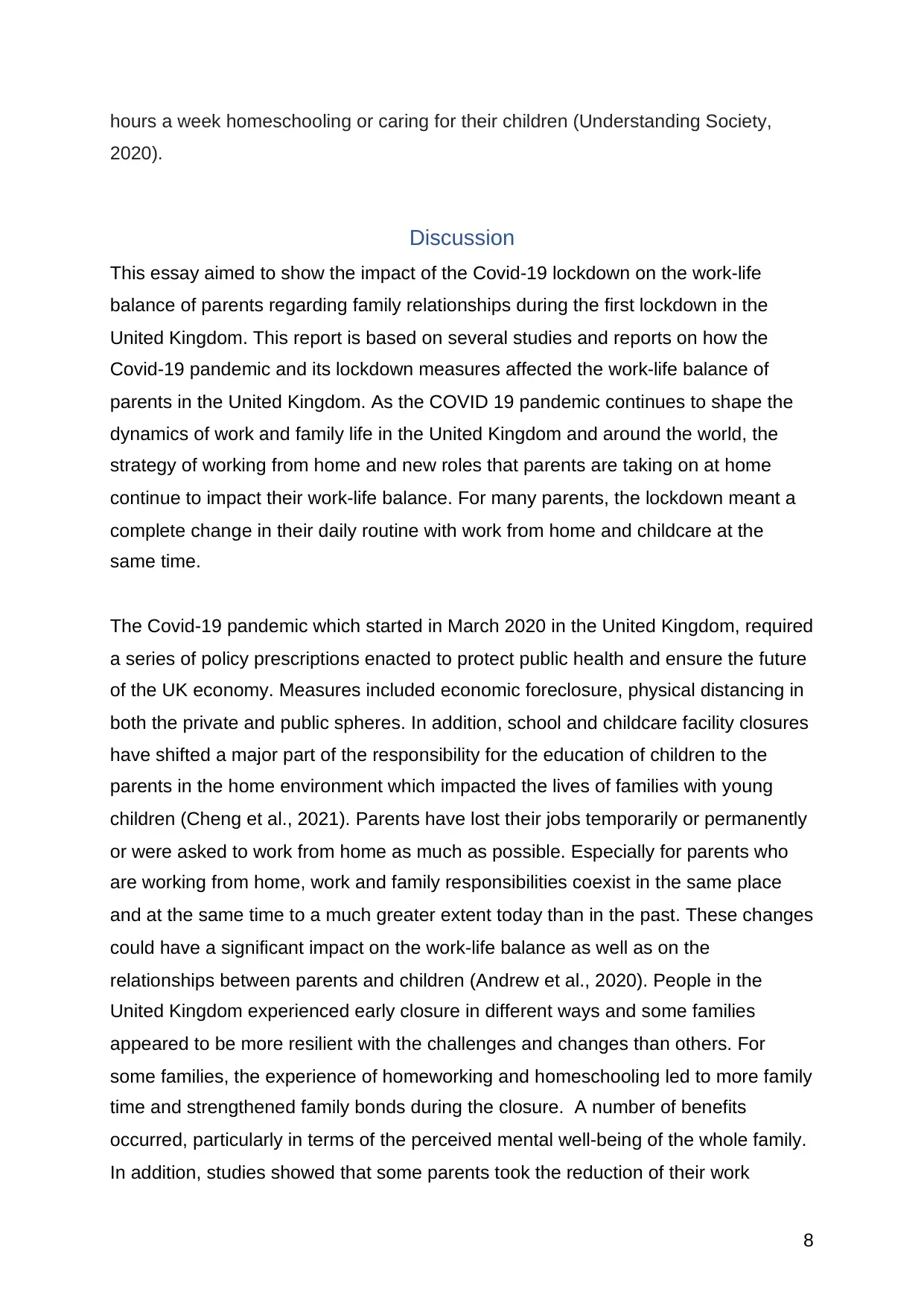
8
hours a week homeschooling or caring for their children (Understanding Society,
2020).
Discussion
This essay aimed to show the impact of the Covid-19 lockdown on the work-life
balance of parents regarding family relationships during the first lockdown in the
United Kingdom. This report is based on several studies and reports on how the
Covid-19 pandemic and its lockdown measures affected the work-life balance of
parents in the United Kingdom. As the COVID 19 pandemic continues to shape the
dynamics of work and family life in the United Kingdom and around the world, the
strategy of working from home and new roles that parents are taking on at home
continue to impact their work-life balance. For many parents, the lockdown meant a
complete change in their daily routine with work from home and childcare at the
same time.
The Covid-19 pandemic which started in March 2020 in the United Kingdom, required
a series of policy prescriptions enacted to protect public health and ensure the future
of the UK economy. Measures included economic foreclosure, physical distancing in
both the private and public spheres. In addition, school and childcare facility closures
have shifted a major part of the responsibility for the education of children to the
parents in the home environment which impacted the lives of families with young
children (Cheng et al., 2021). Parents have lost their jobs temporarily or permanently
or were asked to work from home as much as possible. Especially for parents who
are working from home, work and family responsibilities coexist in the same place
and at the same time to a much greater extent today than in the past. These changes
could have a significant impact on the work-life balance as well as on the
relationships between parents and children (Andrew et al., 2020). People in the
United Kingdom experienced early closure in different ways and some families
appeared to be more resilient with the challenges and changes than others. For
some families, the experience of homeworking and homeschooling led to more family
time and strengthened family bonds during the closure. A number of benefits
occurred, particularly in terms of the perceived mental well-being of the whole family.
In addition, studies showed that some parents took the reduction of their work
hours a week homeschooling or caring for their children (Understanding Society,
2020).
Discussion
This essay aimed to show the impact of the Covid-19 lockdown on the work-life
balance of parents regarding family relationships during the first lockdown in the
United Kingdom. This report is based on several studies and reports on how the
Covid-19 pandemic and its lockdown measures affected the work-life balance of
parents in the United Kingdom. As the COVID 19 pandemic continues to shape the
dynamics of work and family life in the United Kingdom and around the world, the
strategy of working from home and new roles that parents are taking on at home
continue to impact their work-life balance. For many parents, the lockdown meant a
complete change in their daily routine with work from home and childcare at the
same time.
The Covid-19 pandemic which started in March 2020 in the United Kingdom, required
a series of policy prescriptions enacted to protect public health and ensure the future
of the UK economy. Measures included economic foreclosure, physical distancing in
both the private and public spheres. In addition, school and childcare facility closures
have shifted a major part of the responsibility for the education of children to the
parents in the home environment which impacted the lives of families with young
children (Cheng et al., 2021). Parents have lost their jobs temporarily or permanently
or were asked to work from home as much as possible. Especially for parents who
are working from home, work and family responsibilities coexist in the same place
and at the same time to a much greater extent today than in the past. These changes
could have a significant impact on the work-life balance as well as on the
relationships between parents and children (Andrew et al., 2020). People in the
United Kingdom experienced early closure in different ways and some families
appeared to be more resilient with the challenges and changes than others. For
some families, the experience of homeworking and homeschooling led to more family
time and strengthened family bonds during the closure. A number of benefits
occurred, particularly in terms of the perceived mental well-being of the whole family.
In addition, studies showed that some parents took the reduction of their work
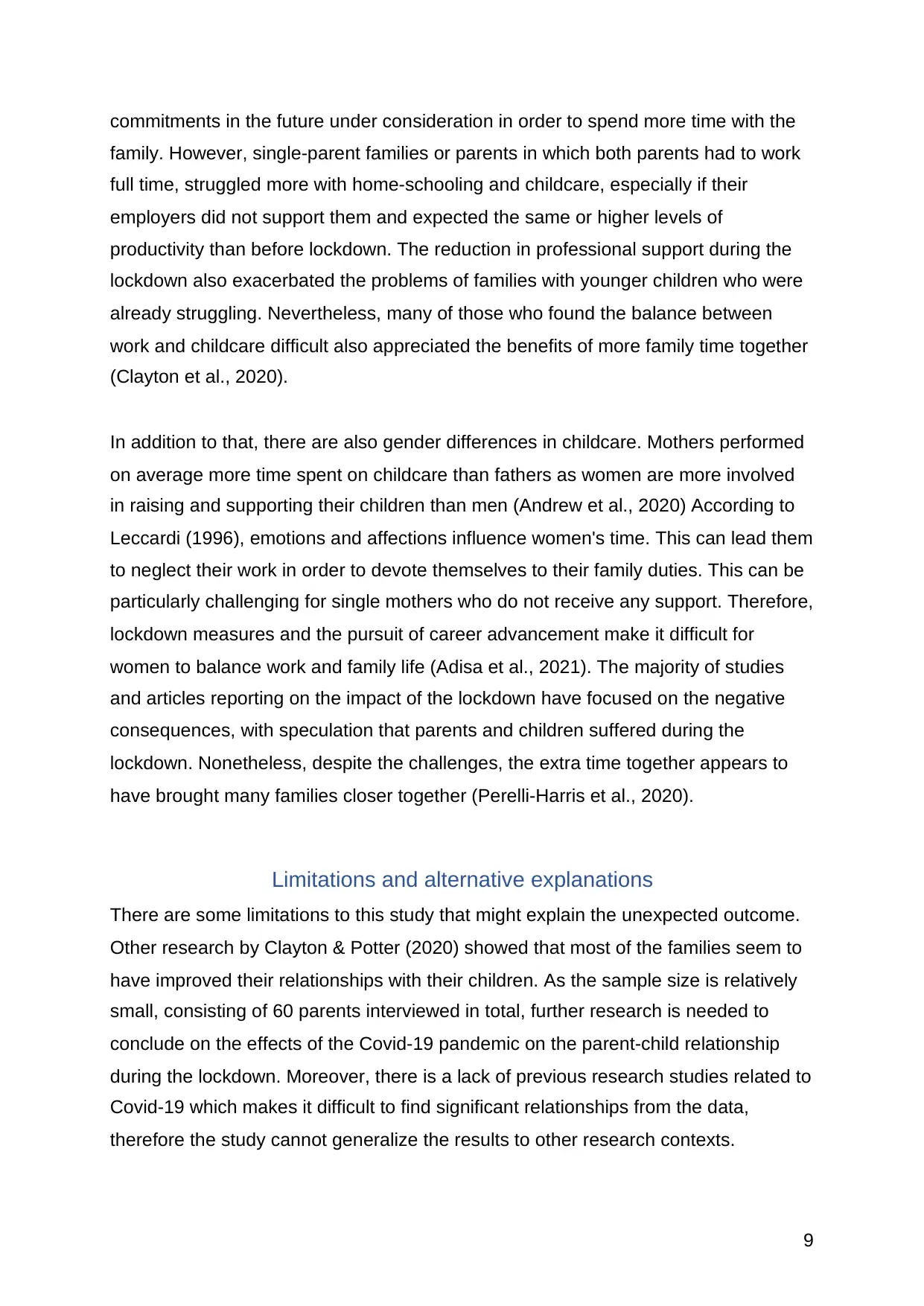
9
commitments in the future under consideration in order to spend more time with the
family. However, single-parent families or parents in which both parents had to work
full time, struggled more with home-schooling and childcare, especially if their
employers did not support them and expected the same or higher levels of
productivity than before lockdown. The reduction in professional support during the
lockdown also exacerbated the problems of families with younger children who were
already struggling. Nevertheless, many of those who found the balance between
work and childcare difficult also appreciated the benefits of more family time together
(Clayton et al., 2020).
In addition to that, there are also gender differences in childcare. Mothers performed
on average more time spent on childcare than fathers as women are more involved
in raising and supporting their children than men (Andrew et al., 2020) According to
Leccardi (1996), emotions and affections influence women's time. This can lead them
to neglect their work in order to devote themselves to their family duties. This can be
particularly challenging for single mothers who do not receive any support. Therefore,
lockdown measures and the pursuit of career advancement make it difficult for
women to balance work and family life (Adisa et al., 2021). The majority of studies
and articles reporting on the impact of the lockdown have focused on the negative
consequences, with speculation that parents and children suffered during the
lockdown. Nonetheless, despite the challenges, the extra time together appears to
have brought many families closer together (Perelli-Harris et al., 2020).
Limitations and alternative explanations
There are some limitations to this study that might explain the unexpected outcome.
Other research by Clayton & Potter (2020) showed that most of the families seem to
have improved their relationships with their children. As the sample size is relatively
small, consisting of 60 parents interviewed in total, further research is needed to
conclude on the effects of the Covid-19 pandemic on the parent-child relationship
during the lockdown. Moreover, there is a lack of previous research studies related to
Covid-19 which makes it difficult to find significant relationships from the data,
therefore the study cannot generalize the results to other research contexts.
commitments in the future under consideration in order to spend more time with the
family. However, single-parent families or parents in which both parents had to work
full time, struggled more with home-schooling and childcare, especially if their
employers did not support them and expected the same or higher levels of
productivity than before lockdown. The reduction in professional support during the
lockdown also exacerbated the problems of families with younger children who were
already struggling. Nevertheless, many of those who found the balance between
work and childcare difficult also appreciated the benefits of more family time together
(Clayton et al., 2020).
In addition to that, there are also gender differences in childcare. Mothers performed
on average more time spent on childcare than fathers as women are more involved
in raising and supporting their children than men (Andrew et al., 2020) According to
Leccardi (1996), emotions and affections influence women's time. This can lead them
to neglect their work in order to devote themselves to their family duties. This can be
particularly challenging for single mothers who do not receive any support. Therefore,
lockdown measures and the pursuit of career advancement make it difficult for
women to balance work and family life (Adisa et al., 2021). The majority of studies
and articles reporting on the impact of the lockdown have focused on the negative
consequences, with speculation that parents and children suffered during the
lockdown. Nonetheless, despite the challenges, the extra time together appears to
have brought many families closer together (Perelli-Harris et al., 2020).
Limitations and alternative explanations
There are some limitations to this study that might explain the unexpected outcome.
Other research by Clayton & Potter (2020) showed that most of the families seem to
have improved their relationships with their children. As the sample size is relatively
small, consisting of 60 parents interviewed in total, further research is needed to
conclude on the effects of the Covid-19 pandemic on the parent-child relationship
during the lockdown. Moreover, there is a lack of previous research studies related to
Covid-19 which makes it difficult to find significant relationships from the data,
therefore the study cannot generalize the results to other research contexts.
Secure Best Marks with AI Grader
Need help grading? Try our AI Grader for instant feedback on your assignments.
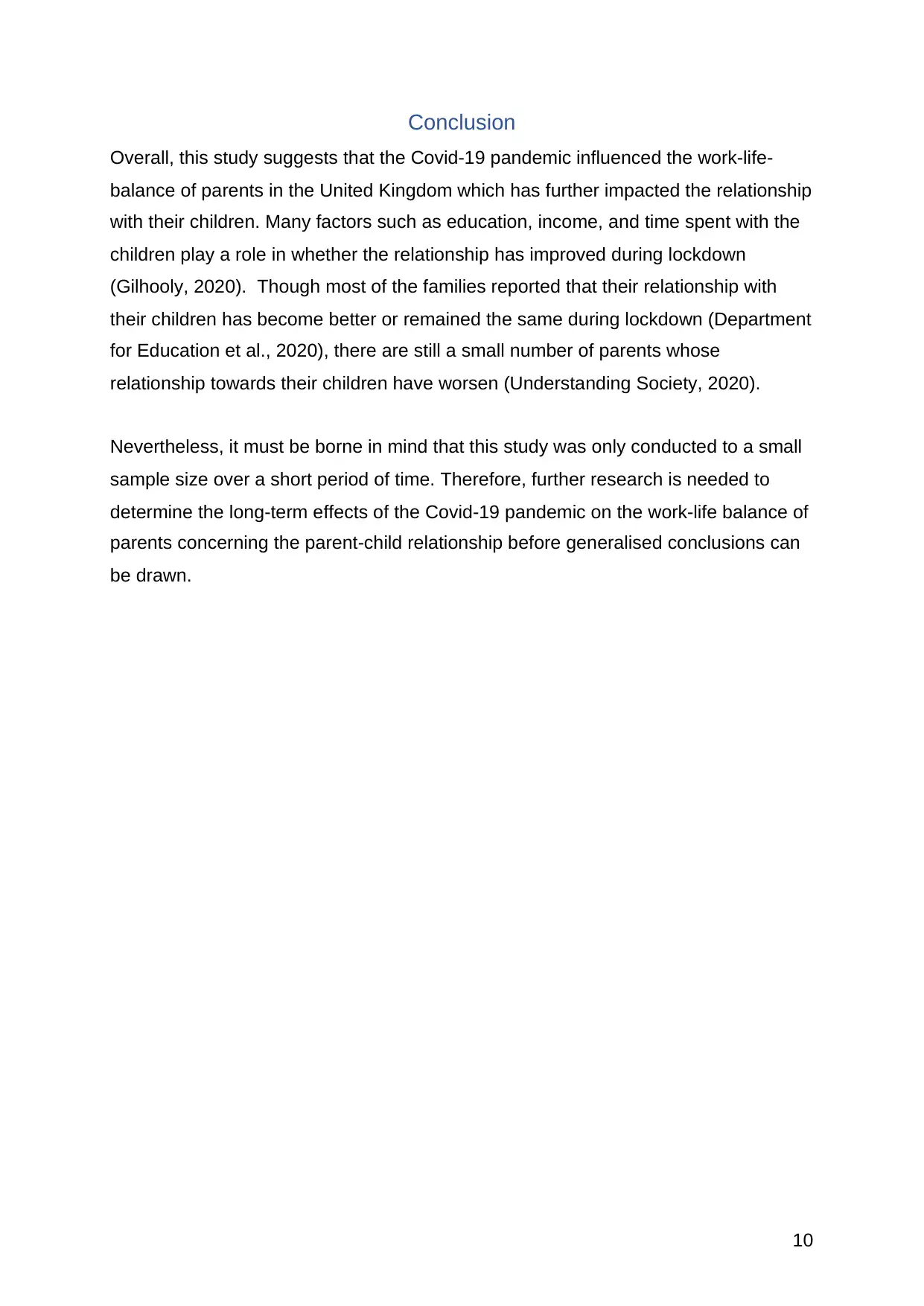
10
Conclusion
Overall, this study suggests that the Covid-19 pandemic influenced the work-life-
balance of parents in the United Kingdom which has further impacted the relationship
with their children. Many factors such as education, income, and time spent with the
children play a role in whether the relationship has improved during lockdown
(Gilhooly, 2020). Though most of the families reported that their relationship with
their children has become better or remained the same during lockdown (Department
for Education et al., 2020), there are still a small number of parents whose
relationship towards their children have worsen (Understanding Society, 2020).
Nevertheless, it must be borne in mind that this study was only conducted to a small
sample size over a short period of time. Therefore, further research is needed to
determine the long-term effects of the Covid-19 pandemic on the work-life balance of
parents concerning the parent-child relationship before generalised conclusions can
be drawn.
Conclusion
Overall, this study suggests that the Covid-19 pandemic influenced the work-life-
balance of parents in the United Kingdom which has further impacted the relationship
with their children. Many factors such as education, income, and time spent with the
children play a role in whether the relationship has improved during lockdown
(Gilhooly, 2020). Though most of the families reported that their relationship with
their children has become better or remained the same during lockdown (Department
for Education et al., 2020), there are still a small number of parents whose
relationship towards their children have worsen (Understanding Society, 2020).
Nevertheless, it must be borne in mind that this study was only conducted to a small
sample size over a short period of time. Therefore, further research is needed to
determine the long-term effects of the Covid-19 pandemic on the work-life balance of
parents concerning the parent-child relationship before generalised conclusions can
be drawn.
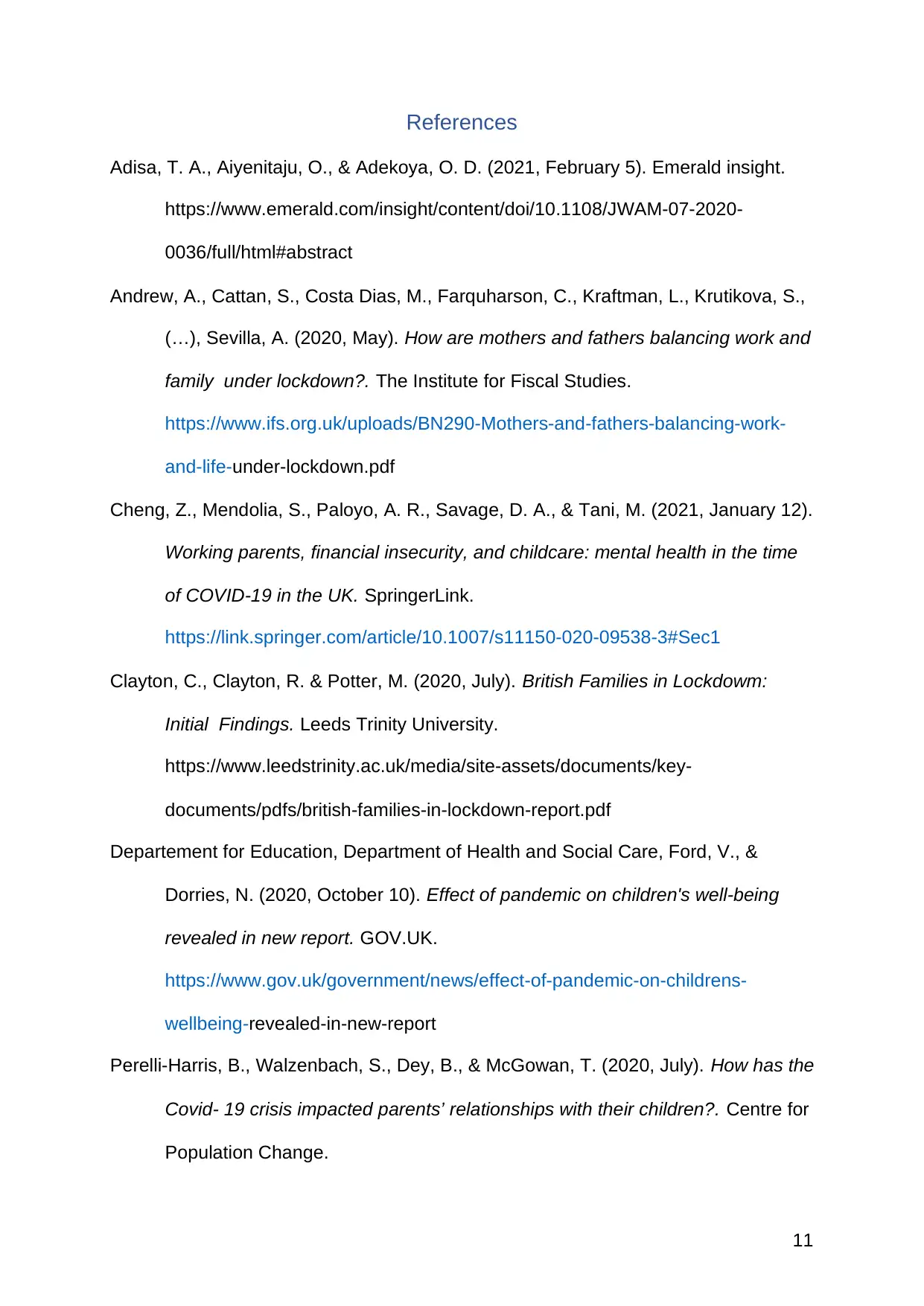
11
References
Adisa, T. A., Aiyenitaju, O., & Adekoya, O. D. (2021, February 5). Emerald insight.
https://www.emerald.com/insight/content/doi/10.1108/JWAM-07-2020-
0036/full/html#abstract
Andrew, A., Cattan, S., Costa Dias, M., Farquharson, C., Kraftman, L., Krutikova, S.,
(…), Sevilla, A. (2020, May). How are mothers and fathers balancing work and
family under lockdown?. The Institute for Fiscal Studies.
https://www.ifs.org.uk/uploads/BN290-Mothers-and-fathers-balancing-work-
and-life-under-lockdown.pdf
Cheng, Z., Mendolia, S., Paloyo, A. R., Savage, D. A., & Tani, M. (2021, January 12).
Working parents, financial insecurity, and childcare: mental health in the time
of COVID-19 in the UK. SpringerLink.
https://link.springer.com/article/10.1007/s11150-020-09538-3#Sec1
Clayton, C., Clayton, R. & Potter, M. (2020, July). British Families in Lockdowm:
Initial Findings. Leeds Trinity University.
https://www.leedstrinity.ac.uk/media/site-assets/documents/key-
documents/pdfs/british-families-in-lockdown-report.pdf
Departement for Education, Department of Health and Social Care, Ford, V., &
Dorries, N. (2020, October 10). Effect of pandemic on children's well-being
revealed in new report. GOV.UK.
https://www.gov.uk/government/news/effect-of-pandemic-on-childrens-
wellbeing-revealed-in-new-report
Perelli-Harris, B., Walzenbach, S., Dey, B., & McGowan, T. (2020, July). How has the
Covid- 19 crisis impacted parents’ relationships with their children?. Centre for
Population Change.
References
Adisa, T. A., Aiyenitaju, O., & Adekoya, O. D. (2021, February 5). Emerald insight.
https://www.emerald.com/insight/content/doi/10.1108/JWAM-07-2020-
0036/full/html#abstract
Andrew, A., Cattan, S., Costa Dias, M., Farquharson, C., Kraftman, L., Krutikova, S.,
(…), Sevilla, A. (2020, May). How are mothers and fathers balancing work and
family under lockdown?. The Institute for Fiscal Studies.
https://www.ifs.org.uk/uploads/BN290-Mothers-and-fathers-balancing-work-
and-life-under-lockdown.pdf
Cheng, Z., Mendolia, S., Paloyo, A. R., Savage, D. A., & Tani, M. (2021, January 12).
Working parents, financial insecurity, and childcare: mental health in the time
of COVID-19 in the UK. SpringerLink.
https://link.springer.com/article/10.1007/s11150-020-09538-3#Sec1
Clayton, C., Clayton, R. & Potter, M. (2020, July). British Families in Lockdowm:
Initial Findings. Leeds Trinity University.
https://www.leedstrinity.ac.uk/media/site-assets/documents/key-
documents/pdfs/british-families-in-lockdown-report.pdf
Departement for Education, Department of Health and Social Care, Ford, V., &
Dorries, N. (2020, October 10). Effect of pandemic on children's well-being
revealed in new report. GOV.UK.
https://www.gov.uk/government/news/effect-of-pandemic-on-childrens-
wellbeing-revealed-in-new-report
Perelli-Harris, B., Walzenbach, S., Dey, B., & McGowan, T. (2020, July). How has the
Covid- 19 crisis impacted parents’ relationships with their children?. Centre for
Population Change.
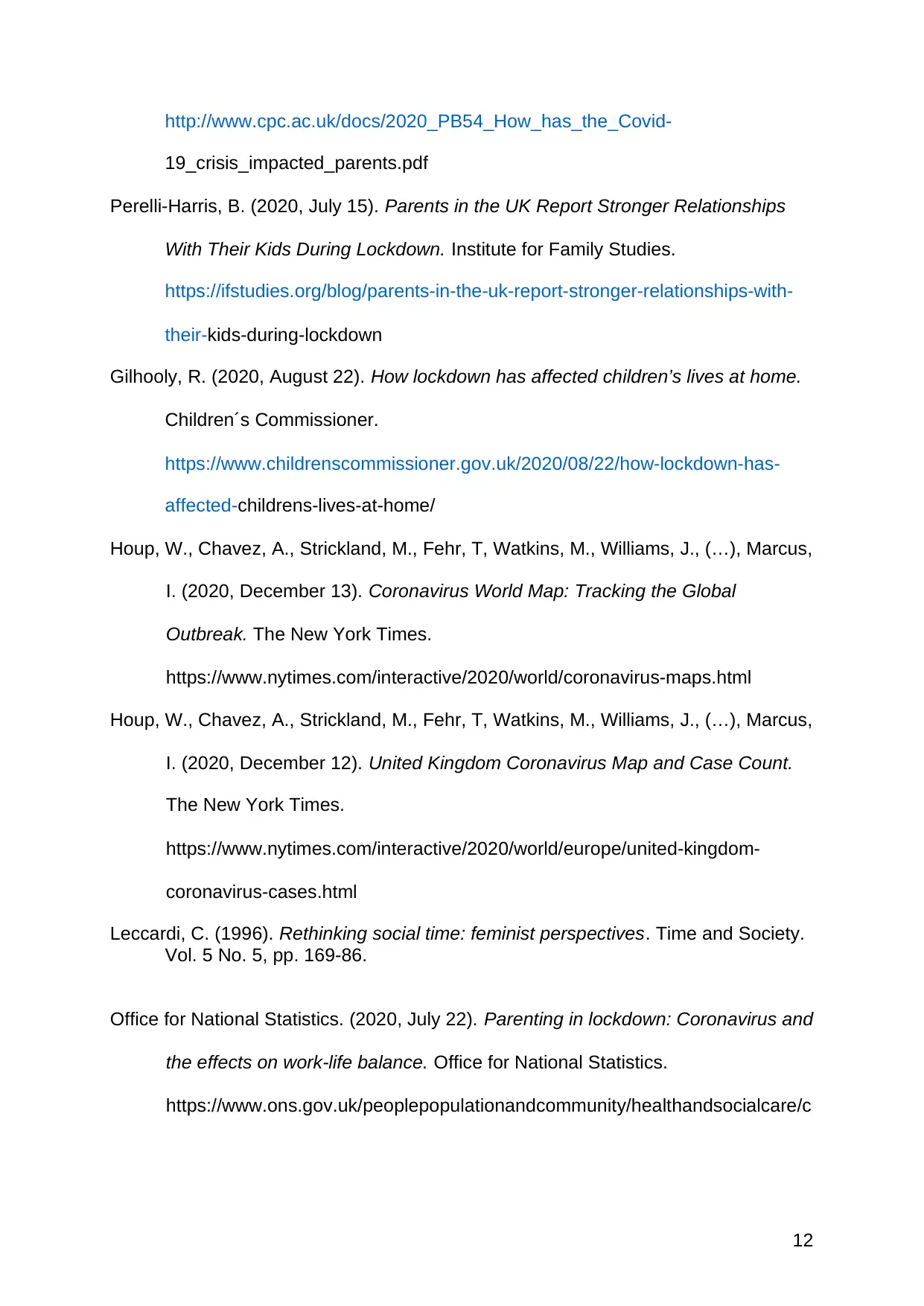
12
http://www.cpc.ac.uk/docs/2020_PB54_How_has_the_Covid-
19_crisis_impacted_parents.pdf
Perelli-Harris, B. (2020, July 15). Parents in the UK Report Stronger Relationships
With Their Kids During Lockdown. Institute for Family Studies.
https://ifstudies.org/blog/parents-in-the-uk-report-stronger-relationships-with-
their-kids-during-lockdown
Gilhooly, R. (2020, August 22). How lockdown has affected children’s lives at home.
Children´s Commissioner.
https://www.childrenscommissioner.gov.uk/2020/08/22/how-lockdown-has-
affected-childrens-lives-at-home/
Houp, W., Chavez, A., Strickland, M., Fehr, T, Watkins, M., Williams, J., (…), Marcus,
I. (2020, December 13). Coronavirus World Map: Tracking the Global
Outbreak. The New York Times.
https://www.nytimes.com/interactive/2020/world/coronavirus-maps.html
Houp, W., Chavez, A., Strickland, M., Fehr, T, Watkins, M., Williams, J., (…), Marcus,
I. (2020, December 12). United Kingdom Coronavirus Map and Case Count.
The New York Times.
https://www.nytimes.com/interactive/2020/world/europe/united-kingdom-
coronavirus-cases.html
Leccardi, C. (1996). Rethinking social time: feminist perspectives. Time and Society.
Vol. 5 No. 5, pp. 169-86.
Office for National Statistics. (2020, July 22). Parenting in lockdown: Coronavirus and
the effects on work-life balance. Office for National Statistics.
https://www.ons.gov.uk/peoplepopulationandcommunity/healthandsocialcare/c
http://www.cpc.ac.uk/docs/2020_PB54_How_has_the_Covid-
19_crisis_impacted_parents.pdf
Perelli-Harris, B. (2020, July 15). Parents in the UK Report Stronger Relationships
With Their Kids During Lockdown. Institute for Family Studies.
https://ifstudies.org/blog/parents-in-the-uk-report-stronger-relationships-with-
their-kids-during-lockdown
Gilhooly, R. (2020, August 22). How lockdown has affected children’s lives at home.
Children´s Commissioner.
https://www.childrenscommissioner.gov.uk/2020/08/22/how-lockdown-has-
affected-childrens-lives-at-home/
Houp, W., Chavez, A., Strickland, M., Fehr, T, Watkins, M., Williams, J., (…), Marcus,
I. (2020, December 13). Coronavirus World Map: Tracking the Global
Outbreak. The New York Times.
https://www.nytimes.com/interactive/2020/world/coronavirus-maps.html
Houp, W., Chavez, A., Strickland, M., Fehr, T, Watkins, M., Williams, J., (…), Marcus,
I. (2020, December 12). United Kingdom Coronavirus Map and Case Count.
The New York Times.
https://www.nytimes.com/interactive/2020/world/europe/united-kingdom-
coronavirus-cases.html
Leccardi, C. (1996). Rethinking social time: feminist perspectives. Time and Society.
Vol. 5 No. 5, pp. 169-86.
Office for National Statistics. (2020, July 22). Parenting in lockdown: Coronavirus and
the effects on work-life balance. Office for National Statistics.
https://www.ons.gov.uk/peoplepopulationandcommunity/healthandsocialcare/c
Paraphrase This Document
Need a fresh take? Get an instant paraphrase of this document with our AI Paraphraser
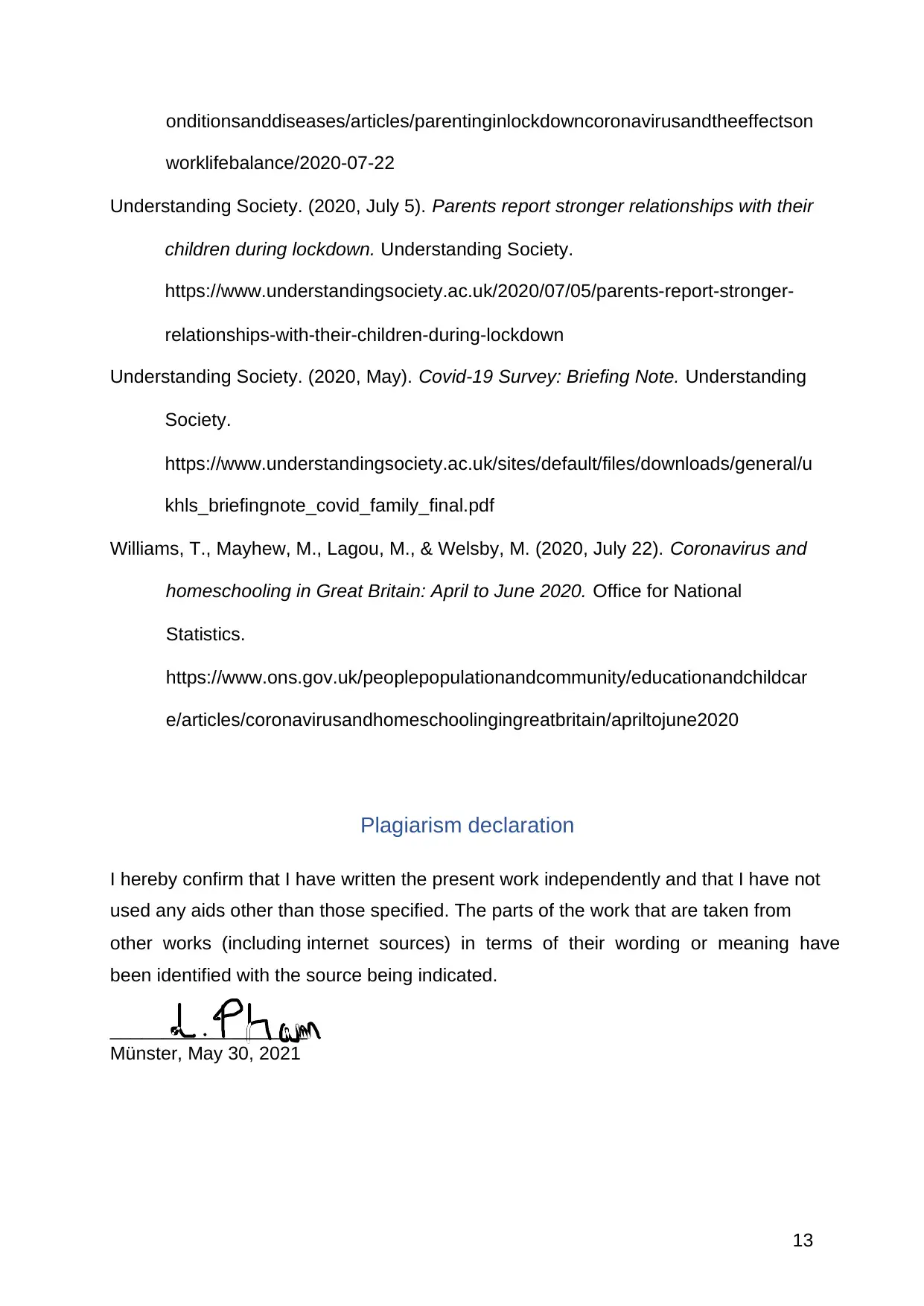
13
onditionsanddiseases/articles/parentinginlockdowncoronavirusandtheeffectson
worklifebalance/2020-07-22
Understanding Society. (2020, July 5). Parents report stronger relationships with their
children during lockdown. Understanding Society.
https://www.understandingsociety.ac.uk/2020/07/05/parents-report-stronger-
relationships-with-their-children-during-lockdown
Understanding Society. (2020, May). Covid-19 Survey: Briefing Note. Understanding
Society.
https://www.understandingsociety.ac.uk/sites/default/files/downloads/general/u
khls_briefingnote_covid_family_final.pdf
Williams, T., Mayhew, M., Lagou, M., & Welsby, M. (2020, July 22). Coronavirus and
homeschooling in Great Britain: April to June 2020. Office for National
Statistics.
https://www.ons.gov.uk/peoplepopulationandcommunity/educationandchildcar
e/articles/coronavirusandhomeschoolingingreatbritain/apriltojune2020
Plagiarism declaration
I hereby confirm that I have written the present work independently and that I have not
used any aids other than those specified. The parts of the work that are taken from
other works (including internet sources) in terms of their wording or meaning have
been identified with the source being indicated.
___________________
Münster, May 30, 2021
onditionsanddiseases/articles/parentinginlockdowncoronavirusandtheeffectson
worklifebalance/2020-07-22
Understanding Society. (2020, July 5). Parents report stronger relationships with their
children during lockdown. Understanding Society.
https://www.understandingsociety.ac.uk/2020/07/05/parents-report-stronger-
relationships-with-their-children-during-lockdown
Understanding Society. (2020, May). Covid-19 Survey: Briefing Note. Understanding
Society.
https://www.understandingsociety.ac.uk/sites/default/files/downloads/general/u
khls_briefingnote_covid_family_final.pdf
Williams, T., Mayhew, M., Lagou, M., & Welsby, M. (2020, July 22). Coronavirus and
homeschooling in Great Britain: April to June 2020. Office for National
Statistics.
https://www.ons.gov.uk/peoplepopulationandcommunity/educationandchildcar
e/articles/coronavirusandhomeschoolingingreatbritain/apriltojune2020
Plagiarism declaration
I hereby confirm that I have written the present work independently and that I have not
used any aids other than those specified. The parts of the work that are taken from
other works (including internet sources) in terms of their wording or meaning have
been identified with the source being indicated.
___________________
Münster, May 30, 2021
1 out of 14
Related Documents
Your All-in-One AI-Powered Toolkit for Academic Success.
+13062052269
info@desklib.com
Available 24*7 on WhatsApp / Email
![[object Object]](/_next/static/media/star-bottom.7253800d.svg)
Unlock your academic potential
© 2024 | Zucol Services PVT LTD | All rights reserved.




